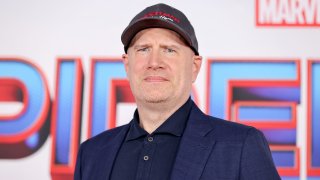
Before he became the president of Marvel Studios, Kevin Feige was rejected over and over.
His central message to the graduating class of 2023 at the University of Southern California, his alma mater, on Friday: Rejection isn't always a bad thing. In fact, it "might just be the greatest thing that can happen to you," he said in a speech.
Feige has a hefty film-making résumé: He graduated from USC's School of Cinematic Arts in 1995, started working as a production assistant doing errands and built his way up to head a premier Hollywood studio.
Over the course of that career, Feige was turned down for opportunities repeatedly, including by USC: He was rejected from the school's film program five times before finally being accepted, he said.
Get San Diego local news, weather forecasts, sports and lifestyle stories to your inbox. Sign up for NBC San Diego newsletters.
Here are three lessons Feige said he learned from being told "no."
'Get comfortable with failure'
At 10 years old, Feige laid out a roadmap to his Hollywood dream, he said: "It seemed very simple: you get accepted to USC, you get accepted to the School of Cinematic Arts, you make a student film that gets turned into a major motion picture, you make Star Wars and then you become George Lucas."
Money Report
"It didn't work out that way," he added.
Feige got into USC, but not the film school. He got his required courses out of the way while continually re-applying to his preferred program, finally getting accepted.
Then, after graduating, his first job was a production assistant role where he filled "hundreds of lunch orders, washed dozens of cars, watched people's dogs, chauffeured people to meetings, chauffeured people's dogs," he said.
His takeaway: Persistence is a prerequisite for success.
"Get comfortable with failure, with rejection," he said. "Accept that it's a possibility but never let it define you and never let it hold you back."
Bad luck 'can be a positive'
Robert Downey Jr. was not Marvel's first choice for the role of Iron Man.
The casting directors and producers first offered the role to Clive Owen, the British actor who starred in films like "Children of Men" and "The Bourne Identity." Owen passed on the role.
"That is the unwritten rule of luck," said Feige. "You know what's better than getting your first choice? Getting the right choice."
That right choice turned out to be Downey, who played the role of Iron Man in 10 movies spanning more than a decade, including some of the highest-grossing films in history.
Luck comes in many forms, Feige said. It's impossible to know whether Owen's take on the role would have become iconic — but Downey's portrayal certainly did.
So whether its professionally, romantically, or otherwise, Feige told the new grads not to be discouraged when a first choice doesn't work out. Quite the opposite: Take it as an opportunity to find a better choice.
'Relish that underdog spirit'
Fifteen years ago, Marvel Studios was not the home of an award-winning cinematic universe. Rather, as Feige described, it was a "scrappy" group of writers and producers workshopping in "a dingy building on top of a car dealership."
"Many in Hollywood thought we were doomed to fail," said Feige. "There were some times where we were close to agreeing with them."
The underdog identity gave the creators license to experiment, since they had no one to disappoint and no expectations to live up to, Feige said. They developed a new kind of superhero movie template: Make movies about lesser-known Marvel heroes, and later tell the story of the universe that connects them all.
Their first attempt, "Iron Man," was a hit — giving them enough credibility to make more movies, even as their second attempt "The Incredible Hulk" performed more modestly at the box office.
The underdog mindset of Marvel's early days instilled a studio-wide commitment to "grinding it out, banging your head against the wall with a group of collaborators," Feige said. That collaboration is what took Marvel stories from "bad to OK to good to maybe great to maybe something people want to watch again and again."
"Even after you've established yourself, having that mentality can really serve you well," he added.
DON'T MISS: Want to be smarter and more successful with your money, work & life? Sign up for our new newsletter!
Get CNBC's free report, 11 Ways to Tell if We're in a Recession, where Kelly Evans reviews the top indicators that a recession is coming or has already begun.






